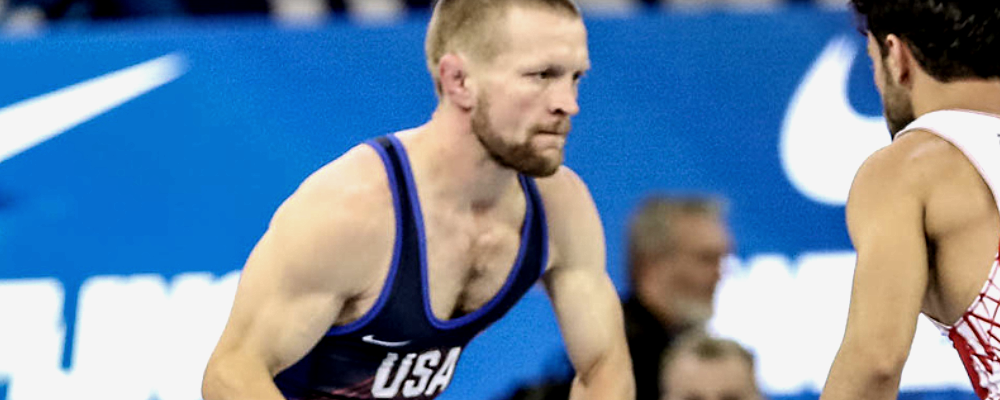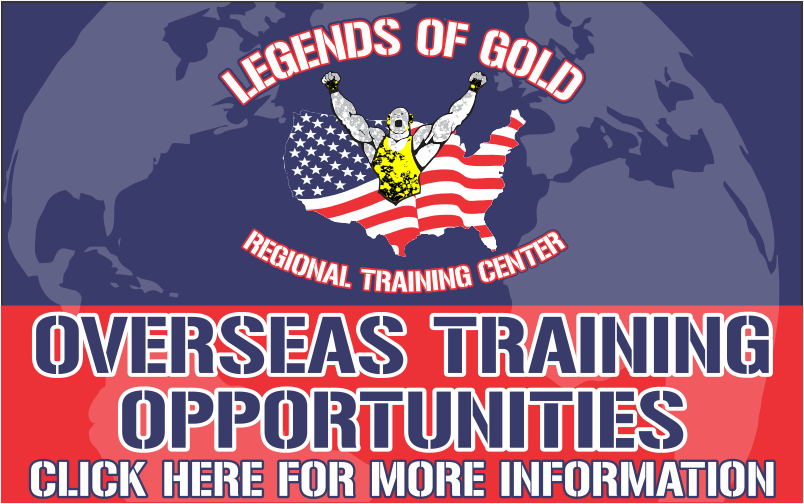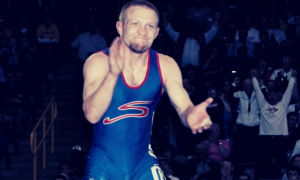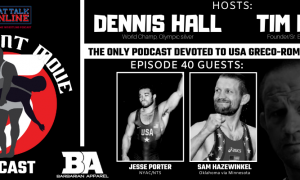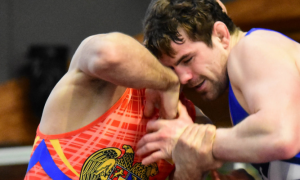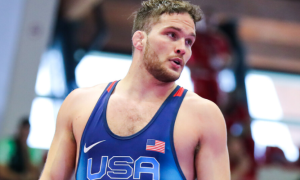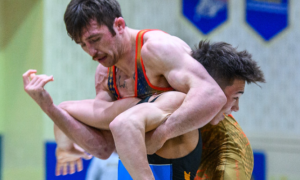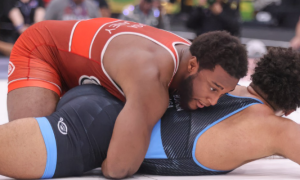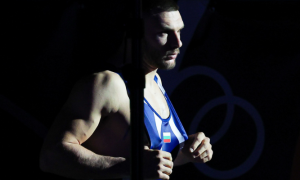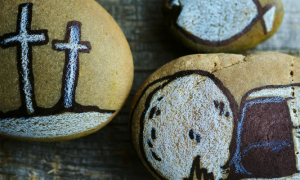We had become used to this kind of conversation.
Beginning with his victory at the 2018 World Team Trials, Sam Hazewinkel and I quickly found a cohesive rhythm. We didn’t know each other prior to that first call on Sunday morning following his run through the 55-kilogram bracket in Tulsa, despite the dozens of mutual friends we shared between us. But that wasn’t any sort of obstacle. Hazewinkel was in quite the chipper mood. He had just achieved a career, if not lifelong objective, and was able to sleep in his own bed after he left the arena.
Put yourself in Hazewinkel’s shoes and imagine what the glow of that morning must have felt like. He had re-entered competition eight weeks earlier on the heels of a two-year absence, and did so as a 35-year-old married father of two who had just become a collegiate head coach for the first time. He gained revenge over the US Open champ and weight class favorite Max Nowry (Army/WCAP) in startling fashion. Even harder to top, Hazewinkel was able to embrace the moment in front of a loving hometown support system, an anomaly if only because so many of these events nowadays are held in venues that usually fail to provide anything remotely resembling a local setting.
Therefore, it was easy to get off on the right foot with the champ.
But of course, Hazewinkel and I are also contemporaries, lack of a better term. I’m just a few calendar flips older and we are both dealing with a pair of young children who dictate our sleep cycles — which is really just a nice way of saying he and I endure our allotment of kicks to the face in the middle of the night since the kids have a habit of occupying space in our beds. This topic has, no question, popped up in just about every on-the-record discussion we had throughout the summer.
We love talking about our kids. All decent parents do. It’s even better when you can find someone who appreciates the distinctive feeling of eating an elbow to the jaw courtesy of an adorable, zombified toddler (or two) on a near-nightly basis.
Yet there was business to get to on that Sunday morning this past June. The prospect of Hazewinkel training for his first Senior Greco Worlds; having a former on-the-mat rival, Spenser Mango, as a coach; and how he was going to be forced to navigate the training phase as an older athlete who is also juggling serious coaching responsibilities.
We covered all of it. And then we went back to the well, consistently. I isolated Hazewinkel’s perspectives after each training camp, and again right before he jetted for Budapest. In total, Hazewinkel’s words were featured in our familiar Q&A format five times between the Trials and his departure for Hungary. Essentially, that is five interviews.
In and of itself, Hazewinkel’s presence on the 2018 World Team was already a story. You could approach that angle once, maybe twice, go over it again for a recap to paint context, and call it a day. But what he had to say carried just as much of an impact as what he was attempting to do. He’s not alone in that regard, to be honest. Practically all of the country’s Senior athletes have incredibly insightful voices deserving of being heard loud and clear, a fact that drives the very mission of this platform.
Hazewinkel’s trek towards the Worlds required a spotlight because he was willing to transparently walk everyone through his process, and the challenges and thrills he encountered along the way. Given his longevity — as well as the enormous amount of success he has experienced, plus growing up as “The Legacy” without ever once complaining about a shadow but instead nestled it closer in effort to create one of his own — the man couldn’t help but deliver repeated wisdom that touched everyone who read those pieces. Myself included, which is saying something, because truth be told, but I am usually the biggest roll-your-eyes cynic you’d ever meet.
So, it is for that reason why Haze and I had to wrap this up accordingly. Locking down a call wasn’t all that simple for either of us. He’s in the middle of his first season as the head coach of Oklahoma City University and my own schedule couldn’t be more chaotic lately. I also wanted to allow him some proper space after the Worlds, just not this much space. That’s life when you’re trying to defend and document our sport.
I’ll miss these things with Hazewinkel, should Budapest stand as his swan song. Zero shame in admitting that. I told him the same thing like 90 times. Graciousness and humility are becoming rare commodities in this world; rarer still when the subject was an Olympian in one style, a World Team member in another, and is embarking on what is sure to be a sparkling coaching career. If Hazewinkels grow on trees, then seriously, we need to plant more trees.
5PM Interview with Sam Hazewinkel
5PM: Literally at the whistle, and I mean at the whistle, you exploded in on Ekrem Ozturk. It wasn’t like the whistle blew and then you moved, it was in an instant. You went after him so fast.
Sam Hazewinkel: I was ready, for sure.
5PM: Was there an emotional component to that at all?
SH: Hmmmm. I don’t know, that’s hard for me to say because I’m not an emotional guy. I’m sure there was, but I couldn’t tell you what it was. There was definitely excitement, you know? I felt really good with where I was at. It was the best I felt going into a match or a tournament in years. I think that was part of it. Plus, if you go out and score first in Greco, that makes a big difference. So I went out there to score.
5PM: So it wasn’t some buildup of angst or anticipation all coming out in a flourish, let’s say.
SH: No. I definitely had energy built up, I was ready to go. It was kind of part of my game plan. I wanted to circle hard to that side and set up my arm throw. I went for that kind of reach around, and I wanted to right away get him to start bringing that right arm up and get that space in there so I could throw him. Which, after watching his last match on the front side, I apparently should have done that on the other side. That guy scored on him three times on that reach around to the right side.
But that was my gameplan. It wasn’t so much to score on the whistle as it was that I wanted the first thing he saw to be me attacking that side, like, Okay, let’s get a little space over there. That was my game plan, Wear him out, wear him out. After that, I got on his head right away. That was the game plan, Go attack, circle hard. Attack that left side hard until he gave me the arm throw. Or whatever he gave me, whatever popped up. But the arm throw was the endgame for my strategy.
5PM: Originally, you didn’t want a broad brush overview of the guys in your weight beforehand, you wanted to see them once you got to Budapest. Did you wind up having any inclination as to who Ozturk was?
SH: Yup, yup, I knew. I watched enough film to know he was one of the better guys. I really thought he was beatable, I really did. And his gutwrench, I’ll say, was a lot better than I gave him credit for. Those low guts I can usually defend, they usually work to my favor, and it did not. But that’s part of getting taken down so fast. At that level when someone scores early, they’re strong. We’re smart enough to know, This is my best chance to score from top, I have lots of energy and I’m feeling strong. And he took advantage of it, for sure. It’s the same way I lost to Daniel Dennis when we wrestled at the US Open — quick arm drag right to a bunch of guts and it was done. It has been something I apparently needed to work on more. Although, I say that. It’s part of, well to me it’s getting older, maybe it’s not for everybody. It used to be simple. You just go attack.
I looked at my gameplan a lot, whether I needed to score early when I was fresh — or to kind of play the game a little bit, wear him down, and let experience take over later in the match.
5PM: You mean when it can actually become a wrestling match.
SH: Yeah, yeah, wear him out, get to scoring position and score late; or try to score right away. The game plan still wound up being trying to score early. I was still going to wear on him but I was going to try to score right away.
You know, something like that happens and you’re saying, Man, I should have played the long game. But you can’t do that. You can’t do that. You stick to the plan, learn from it, and move on. You can’t have What if’s? and I should have’s. You don’t become good at wrestling doing that. You figure it out.
I think it was the right plan, I just think it was one of those things like, Man…. You can’t go down that quick, you can’t give up points that early that fast, and at that level. I know that. That’s why. That’s what happens.
5PM: This is understanding I’m speaking to an Olympian, but was there anything about the fact that this was your Senior Greco World debut? Was there anything about this being your first time in the tournament that positively or negatively played a role?
Sam Hazewinkel: I don’t think so. No, I don’t think so. There could have been, but I like to think I’m kind of passed that. I’ve been around it enough to know that those kind of thoughts don’t matter. It doesn’t matter how you go about it, you don’t want to think too far ahead. You just have to score the next point. I know that afterwards it hurt a lot. But going into it I just tried to execute my gameplan, in my match.
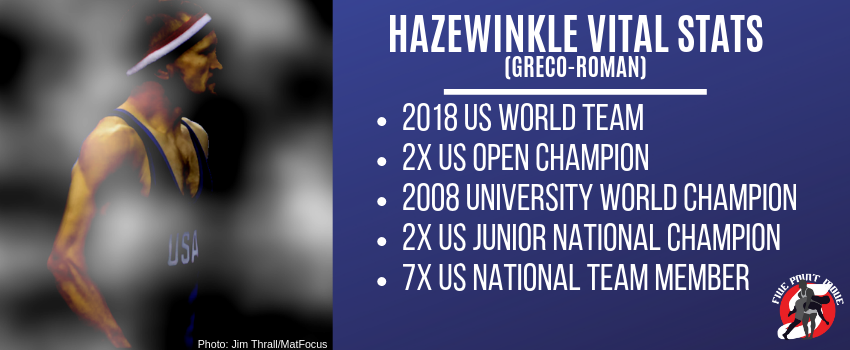
5PM: Did you like your state of mind once you arrived in-country? Did you get that feeling we had talked about, that whole, I can’t wait to get there attitude? What was it like once you finally touched down in Budapest?
SH: Yeah man, it was exciting. I was really happy with where I was at. I felt good. It was what you might expect. My first practice overseas was a little rough. I felt like I got the flight out. And my second practice was horrible, but then it was out of my system. I felt great after that. As the tournament started to approach, I felt great. Everything was clicking.
I felt like it was the best camp we had, at least that’s where I was at. I didn’t know how those guys who had already been there for a couple of weeks were going to be feeling, but it seemed like they were in a good place. There was that picture going around of (Adam) Coon and I and he’s holding me up in that dance move. I felt like everybody was in a good place. We were focused but still having fun. There wasn’t too much of an over-focus, and there wasn’t too much having fun to where you have to avoid it. I liked where everyone was at and that goes for me, too. I mean it. I really felt good going into my match.
Now, had I wrestled first-thing in the morning, that might have changed. I felt sick in the morning, which I don’t know if that had ever happened to me before. I had never thrown up the morning of, other than when I got food poisoning. But I was throwing up that morning (in Budapest), I was not feeling good, and then it passed. I wound up not wrestling until later and I felt great. I don’t know, it’s just one of those things. I felt really good going into it.
5PM: So you see, right there. You say you felt great and I’m sure you did. But just the fact that you had at least felt sick prior would be more than enough for so many others to use that as an excuse. I threw up, that clearly means I’m not 100%….
SH: Right, but that’s part of it. Sometimes, wrestlers have an excuse, but I am not that way. I was worried while I was throwing up. I was like, Man, I do not feel good. We did that warm-up match and I felt terrible. I was drenched in sweat and not because I was working hard. I was dead tired and my stomach hurt. But maybe that’s why I felt so good when I went out there later.
5PM: You got something out of you?
SH: Yeah! And I felt crappy that day. That was not an ideal circumstance to go wrestle at the Worlds. But when I was feeling good, I was like, Man, that could have been a lot worse. I could have been out there earlier today. I don’t know if that had anything to do with it or not. I know I was ready to go. I was chomping at the bit when we went out there.
5PM: Right before you left for the tournament and we talked, you were saying I could be done, I could be done. And then afterwards to the media pool, you basically said the same thing. You seemed to arrive at that semblance of finality beforehand. But if it had went differently, if you had went on a run…you know what I’m saying?
SH: Yeah, if I won, it would have been a great way to end. If I lose, it’s not a great way to end… But it was good. I got it out my system. I wouldn’t say I’m done, just because I like competing. The Olympics come around, I might say, You know what, I need to go compete. But if something happened and I couldn’t, it would not bother me. I am happy to be done, I don’t plan on wrestling this year. I went into it kind of knowing that. I knew this would be a last shot. I almost didn’t wrestle, you know, and I think that’s the part that was good for me. Before, I was just kind of done. I went into this one knowing, This is it. It had a finality to it beforehand.
I will say that’s one of the things that was harder to deal with, and never having to deal with before, is wondering if I was the right guy. Like, I earned the spot, but would a younger guy do better? Someone who never had a chance before and didn’t have as much going on? That was a real battle. I think, no, I know I was in a good place once I got there. Once I flew over I was there to win.
But it was something I faced when I’m only at half the camps, I’m coaching guys. That was a battle I hadn’t had to go through before. Am I being unfair to my team? Am I being unfair to guys who have been training year-round? Because I had been there and done that.
I don’t know why I brought that up. I don’t think it had to do with anything once I was in Budapest. But it was funny to me, something that I didn’t expect to be an issue in my head, you know? I don’t know, I don’t know. It was good though. To bring it full circle is part of the reason I knew I was done. I was coming around to it in my own head, anyway, if that makes sense.
5PM: So what you’re saying is if you weren’t done, those types of thoughts wouldn’t have entered your mind.
SH: Yes, for sure. That’s a good way to say it.
5PM: It is December, so it’s not even eight months ago when you entered the Open and this whole journey first began. A part of me wonders how you’re going to see the US Open years from now, forget about the result. The vibe that brought with it, how it was last minute and you wound up making the final and this whole thing kicked off. The zenith moment I’m sure was when you won the Trials, but it’s at the Open where it was like, Oh hey, Sam’s back, and look what it led to.
Sam Hazewinkel: It was definitely a good thing. Had I went out there and got beat up right away, it probably would have never happened. And had I won it, I don’t know if I ever go on to win the Trials. It had its own little goal. It would have been my fifth US Open title. That’s how many my dad won. I think it was in the early-2000’s, they started the records at five, guys who had won five US Open championships and so on. That had always been a goal of mine, I have to get in that record book.
So had I won it, I don’t know what would have happened. It would have been interesting to see. I do know that it’s easy when you’re winning to not feel like you have to get better, you just have to maintain. Oh, I’m winning, I’m doing things right. When you lose, you’re motivated to get better. So who knows what would have happened if I won it? I might have checked it off the bucket list and said that’s enough. And at the same time, if I had gotten beat up right away I might have said, Yeah, I’ve been off a couple of years, I need to coach, anyway.
I think it worked out right. It was fun. It put a little fire under me and it obviously ended up working out. But it was fun. It was fun to be back. That’s the part where I say that I’m never going to be the guy who leaves his shoes in the center of the mat, because, I might start Veterans next year. Who knows? I love competing way too much, I love wrestling way too much. I’ll be bringing guys out there, and you never know. Anyone who knows me knows it’s not surprising if I lace up my shoes once again.
5PM: I would think that you saw a lot of the training during the summer both as a coach and an athlete, right?
SH: It was a learning experience, and it was hard and it was fun all at the same time. There is always that battle, This is what I used to do, and this is what I need to do now. I’ve said it before, I was kind of the middle man. I wasn’t quite one of the athletes and I wasn’t quite one of the coaches, and I really enjoyed it. It was fun being the middle man. It was great for my coaching here (at Oklahoma City University). I got to see the athlete side still and it helped me a lot. It’s something that I’m trying to do now that I’m not competing. It’s easy when you’re coaching to be like, We’ve got to get better, we’ve got to win this, we’ve got two weeks to do it. I have to bring it back and remember to hold myself accountable, because it is going to be hard to do. It is going to be hard not to jump back into that coach mode. Maybe I need to, you need that a little bit. You need coaches on you. But so far, I’m trying not to do it, I am trying to remember the athlete point of view.
It was fun, man. It was good for me. It was unbelievably stressful. I was so busy. I have so much more time now, which I love. But it is also so much easier now to put things off and wait, as opposed to when I was training and coaching and it was like, If I don’t do this now, it’s not going to happen. I have to be on it. I had unbelievable structure every day. I definitely ate better, too. I’m already going for that coach’s belly (laughs). All of those coaches who used to wrestle have that, so I’m on it.
It was hard and tough, but I loved it. It was a blast.
5PM: You have obviously enjoyed an amazing competitive career…
SH: I appreciate that.
5PM: It’s just the truth. And you didn’t need this. Your career was already spectacular prior to 2018. But having stamped your place as a Senior Greco-Roman World Team member, did that in any way serve as an exclamation point?
SH: Absolutely, and it kind of helped with the closure I think. I had come to terms with it, but being an Olympic Team and Senior Greco-Roman World Team member? That was my dream from way back. It’s what my dad made, it’s what I always thought I would make. Making freestyle (Olympics) kind of met a bunch of my goals, but I don’t know. That was my first dream, to be the Greco guy, and it was a blast making that Greco Team and having my dad there in my corner. I felt bad, he was standing there with the Army coaches. He wasn’t on our side of the mat, he was right there next to the Army coaches. I don’t think he had any idea, he was just pumped to be matside on a raised platform.
It was so much fun having him there, him getting to see it. And that’s one part that I loved about all of it, he got to see me make a Greco Team, because I knew that was a goal of his for a long time. It was great, right up there with my top experiences. My older son was there. I just found a video a couple of days ago, I’ve got to put it on Twitter, of my son Josh wrestling with me right before the finals. He came over there to say “Hey” and we ended up wrestling a little bit. And then I make the Team and my dad is on the side of the mat. It was an experience. I’m far enough along now to realize that it’s not something you see everyday and people might not get to be a part of it. That’s why I’ll remember it for a long time. It is sealed in my memory. Which is impressive because I forget about everything (laughs).
Ok here is the video pic.twitter.com/Dyl3MTJUx2
— Sam Hazewinkel (@SamTheHaze) December 17, 2018
5PM: You stepped away for a couple of years and this time around it was a new era. 2018 is different than 2014. You were on the inside of the program once again and caught a bird’s eye view of the scope of talent available within the depth of our country. Where do you think the Greco program is going, and what do you think needs to improve?
Sam Hazewinkel: I’m curious to see where the program is going. I think we all expected a little bit more this year and it has been a little while in terms of medals. So I’m curious to see what happens because on the other hand, our youth Greco is doing better than it has ever done. It is on the rise, for sure. At these other tournaments we’re winning lots of medals at the Senior level, too. I am, I’m curious to see what happens. It’s no secret there was a lot going on with the coaching staff for the USA, so I am right there and I’m curious to see. I really am.
I don’t know what’s going to happen, but if I step back and look, we’re moving in the right direction. And I don’t know if we were moving in the right direction a couple of years ago. It seems like the youth through, I don’t know, the University level, is moving in the right direction — and I don’t know if I’ve ever felt that way. It seems like it’s growing, it seems like we’re winning medals. It seems like there is an excitement. More and more, I am hearing about kids who just want to do Greco, which, that didn’t happen when I was in college. It happened in that guys would join the Army and be on the Greco team rather than doing college. But they wouldn’t announce it. Junior’s weren’t saying, Oh, I’m going to do Greco. I’m not worried about going Division I. Coaches don’t worry about recruiting me, I am going Greco. I feel like I hear that more and more.
So, I’m excited about the direction we’re headed in. I think Greco is on the rise right now. The US set a medal record this year and watching the freestyle team do as well as it did, the women do as well as they did, and Greco, we had a guy in the finals. I think America is starting to get behind it, I really do. We’ve got freestyle where it needs to be. The women are right there. It’s the American way, we want to win and we want to win in every style.
When everybody was fighting, it was easy for people to jump on the freestyle bandwagon because that is where our best Division I guys go. And now I think we’ll see more people jumping on Greco, especially if we keep allowing guys the opportunity to make the freestyle team and the Greco Team. That is something we’ve needed to do for a long time. We need to get those really good athletes to start doing some more Greco. It needs to happen. Making the Olympic Team is the goal, winning is the goal. We want USA #1 all across the board. Not just in one style.
I’m excited. I am excited about the direction. There is room for growth in a lot of ways and I don’t know if I have the answers, but we’re heading the right way. The RTC’s are starting to do Greco. I think that’s a big step. You see Greco growing right now, and that’s good. We need more of that.
Follow Sam Hazewinkel on Twitter for updates on his career and competitive schedule.
HAZEWINKEL 2018 ARTICLES
- Post-World Team Trials.
- After Oregon training camp.
- After Vegas training camp.
- After German Grand Prix.
- Before leaving for the World Championships.
SUBSCRIBE TO THE FIVE POINT MOVE PODCAST
iTunes | Stitcher | Spreaker | Google Play Music | RSS

Notice: Trying to get property 'term_id' of non-object in /home/fivepointwp/webapps/fivepointwp/wp-content/themes/flex-mag/functions.php on line 999

